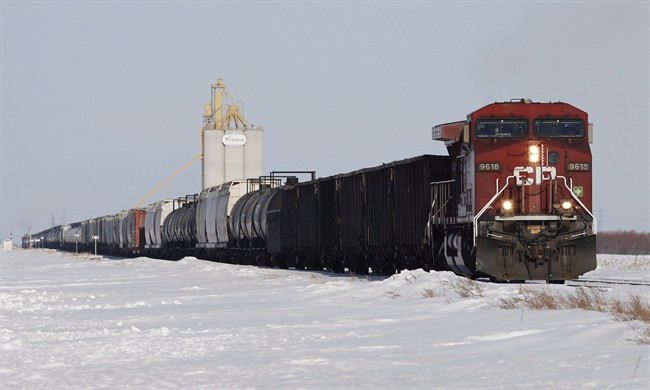As the Alberta legislature resumes on Thursday, the debate is heating up about how products of various kinds that are produced in this province are to be shipped to markets where there are buyers ready to receive them.

The time-honoured argument between grain producers and the railways is in full swing. Producers have complained to Ottawa that the railways aren’t supplying enough hopper cars to move last fall’s crops to waiting ships.
The railways counter that the severe winter weather, especially in the mountains, means shorter trains and slower speeds.
The federal government’s traditional role as referee is compromised a bit by the fact that Bill C-49, the new omnibus Transportation Act, is being held up in the Senate over debate on proposed passenger rights legislation.
Grain farmers want the railway portion of the Act to be passed separately and soon, but so far Minister of Transport Marc Garneau has resisted splitting the bill.

Get daily National news
The argument over pipelines has been well-documented. It remains an economic reality that moving crude oil and natural gas to the West Coast for shipment to willing customers in the Asia-Pacific region is both necessary and frustrating because of resistance by various British Columbia governments.
When all this Alberta-produced product arrives on the West Coast, it has to be transferred from railway cars or pipelines to ships.
- Moraine Road RV residents get temporary extension while city seeks long-term solution
- Calgary’s termination of Green Line adds extra frustration for expropriated Eau Claire residents
- Calgary police searching for sexual assault suspect after attack at swimming hole
- Home ownership feels out of reach for many in Calgary
That’s the responsibility of the Chamber of Shipping, which oversees operations of the Port of Vancouver. It produced record-setting volumes of business in 2017 in terms of cargo, including container traffic.
“We’re having to be more organized and efficient in how we handle cargo,” Chamber of Shipping president Robert Lewis-Manning told me. “And we’re trying to be better at anticipating what demand will be so that we can properly be prepared for it.”
What he can’t do is make the Port of Vancouver any larger than it currently is. Prince Rupert can absorb some of the increasing demand for West Coast shipping. But at some point, a maximum capacity will be reached.
When that happens, there will be an inevitable wait for ships which will be moored at offshore anchorages awaiting their chance to take on cargo. As ships get larger, the time it takes to load them takes longer. And ships don’t make any money sitting at an anchorage.
It’s not clear what the answer is. What is clear is how much Alberta needs the West Coast to export its products. Hopefully somewhere, someone is thinking about future options.
https://omny.fm/shows/alberta-morning-news/moving-the-grain
https://omny.fm/shows/alberta-morning-news/port-of-vancouver










Comments